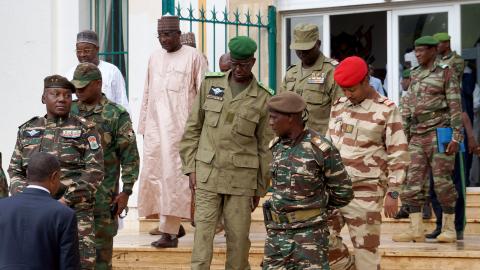For the past three years in the Sahel region of West Africa, regional actors and the West have not responded sufficiently to the frequent coups there. Each unchecked coup appeared to set the stage for the next one. Last week’s coup in Niger, however, has proven so polarizing across West Africa that it risks sparking a regional war.
Washington needs a policy to respond to the prospect of a multi-sided regional war in a region of strategic significance. Those seeking to reverse the trend of coups have no silver bullets, but it may not yet be too late to find a compromise in the truest sense of the word: a political resolution that leaves no party entirely happy, while also leaving no party so angry that it might destabilize West Africa in response.
When members of Niger’s Presidential Guard overthrew President Mohamed Bazoum on July 26, it struck a major blow to democracy in West Africa and the security policy of the United States and Europe in the region. Niger was the fourth West African country to fall to a coup since 2020 (not counting Chad’s pseudo-coup, a militarized father-to-son transition in 2021). Unlike those other countries, Niger hosts some 1,000 US soldiers who support Nigerien and European counterterrorism efforts. Niger had also become the locus of French security policy following the rise of juntas in neighboring Mali and Burkina Faso that quickly expelled the former colonial ruler. Notably, and in contrast with his heavy-handed neighbors, President Bazoum had overseen the development of a relatively calibrated and effective counterterrorism policy that set Niger apart in the region.
The July 26 coup now jeopardizes that approach and risks exacerbating insecurity across West Africa, including the more economically dynamic coastal countries that have been the focus of US strategy of late. For a mixture of personal, political, and strategic reasons, the leaders of those coastal countries have surprised many observers by taking a particularly hard line against the junta in Niamey.
The Economic Community of West African States (ECOWAS) has responded meekly to previous coups in the region. But under newly inaugurated Nigerian President Bola Ahmed Tinubu, ECOWAS issued a seven-day ultimatum on July 30, demanding that the junta in Niger restore power to President Bazoum or face measures that “may include the use of force.” The organization has followed through with a meeting of various member states’ defense chiefs in Abuja to discuss the crisis in Niger.
The various leaders of ECOWAS countries have their own interests in reversing the coup. Restoring civilian rule aligns with US objectives, but ECOWAS is threatening to go further than Washington’s sanctions-based approach. (The State Department’s public messaging regarding ECOWAS’s proposed approach has been ambiguous, muddling the picture.) There are signs that even as ECOWAS expresses a desire for dialogue with Niger’s junta, the military option remains on the table. Other West African states have begun to express their support for a Nigerian-led intervention.
Niger’s junta, for its part, has signaled that it will not budge. President Tinubu sent an ECOWAS delegation to negotiate with the junta on August 3. Despite initial hopes that talks would lay the groundwork for a peaceful settlement, the delegation went back to Abuja early and empty-handed. That same evening, Niger’s junta accelerated its diplomatic break with the West and drummed up its bellicose rhetoric against ECOWAS.
Thus, the situation looks bleak two days before the expiration of ECOWAS’s ultimatum. Any ECOWAS intervention is fraught with immense risks. First, it is unlikely Bazoum would regain the same degree of legitimacy he enjoyed before the coup if foreign guns put him back in power. More to the point, Bazoum might not even survive the intervention, since he remains a hostage of the junta. An ECOWAS intervention would only succeed if Niger’s junta were to fold or a critical mass of the armed forces were to defect the moment ECOWAS forces cross into Niger (and, crucially, if there were a modicum of consensus among Nigeriens on who should take power in the junta’s absence).
There is also a risk that an intervention would have the opposite effect. If the junta were to dig in its heels and rally the populace around the flag—possibly even arming civilian militias—the intervention could morph into a multifaceted counterinsurgency that ECOWAS would not be prepared to handle. At the moment, the junta appears to be threatening this approach, gambling that its best hope for legitimacy lies in channeling the population’s frustrations toward an external enemy.
No ECOWAS member state can afford to have its military bogged down in a protracted counterinsurgency abroad, least among them Nigeria’s. Abuja’s armed forces are already overstretched, grappling with high levels of insecurity in nearly every part of the country. And despite the pledges from other ECOWAS member states, President Tinubu should not expect much help from the bloc’s other under-resourced militaries. Nigeria shares the longest land border with Niger. Whatever the cause of Niger’s destabilization, Nigeria will bear the brunt of its effects.
The prospect of an intervention has already polarized Nigerians, many of whom argue that Nigeria’s numerous domestic problems, including a cost-of-living crisis and insecurity, should take priority over the status of Niger’s government. The intervention seems to have also caused some grumbling within the Nigerian security sector, as some military officials have privately aired frustrations to the press and leaked a sensitive operational document on social media. But civil-military relations are stronger in Nigeria than elsewhere in the region. Thus, the junta in Niger should make no mistake: Nigeria’s military will move ahead with an intervention if President Tinubu orders it.
This should worry the junta as well. Its swaggering rhetoric notwithstanding, a regional conflict would be a major gamble for the military regime in Niamey. The junta would face a real risk of cracking—if not immediately, then at some point down the line once the bodies start to pile up. The generals ruling this landlocked and impoverished country would have limited options for external support. In what passes for pan-strongman solidarity, Mali and Burkina Faso have suggested that they would come to Niger’s defense in the event of an ECOWAS intervention, though it is unclear what this would mean in practice given that those nations’ armies can hardly leave their respective capitals without running over jihadist landmines. Niger’s junta is reportedly looking for support from the Wagner Group to fill the vacuum. But Wagner would be unlikely to tip the scales much if a Nigeria-led ECOWAS fully committed to the fight, especially with air power. The junta may also hope that Algeria will provide a lifeline, but Algiers might be wary of extending overt support. Drawing ECOWAS into a war therefore does not seem like a good long-term strategy for Niger’s junta. Unfortunately, the putschists might not be thinking about their long-term survival at this stage.
The situation is very worrying, but Washington and ECOWAS should still seek an acceptable settlement that would avert a larger war. A compromise would first need to convince the junta members that they are not facing an existential threat. Second, it would need to give ECOWAS some face-saving opening for further talks. Down the line, a broader political deal could still be salvageable. However, at this stage, a deal would most realistically involve a transition back to civilian rule rather than the immediate restoration of President Bazoum. It would require significant engagement and the tactful exercise of leverage on the part of Washington and its partners to avoid repeating the mistakes of failed transitions like those in Sudan or Mali, where military forces stepped back in to assume power, only to destabilize their states further. But a transition in Niger, though unideal, is preferable to a protracted regional war. The principal victors in any drawn-out conflict would be the Sahel’s ever-expanding jihadist groups, a fact that is hopefully not lost on the generals in Niamey.
Unfortunately, Americans have a tendency to assert what policy is in African states’ interests (and sometimes they are even right) only to see hard-nosed if vulnerable African governments do the opposite. Washington should continue pushing for its preferred outcome but be prepared for two less ideal scenarios: the junta prevails, breaks with the West, and proves that ECOWAS’s threats were empty; or ECOWAS moves ahead with an intervention that risks bringing West Africa back to the 1990s, when competing regional power blocs waged proxy battles amid the civil wars in Liberia and Sierra Leone.
We are witnessing history in the making over the next few days, for better or worse.















